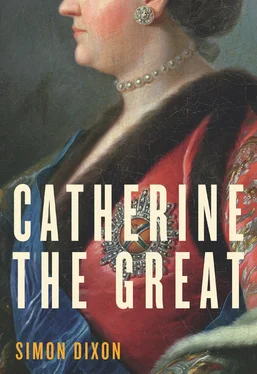Evidently the empress was unable to rely on books alone in her quest for polite refinement. Many Russian nobles were illiterate and, as Novikov discovered, it was impossible to make a profit from the small number of sophisticated men who subscribed to his journals (many of which were eventually recirculated as hair-curlers). Though it sold better than any other Russian journal in the eighteenth century, The Drone petered out like the others as print runs slipped. They would scarcely have survived at all without support from Catherine and her Court. Novikov was swift to return the compliment, as part of a new compact between writer and ruler in Russia. When the empress turned to her beloved theatre as the best way of promoting civilised noble values in 1772, Novikov declared O these times! , the first, best-known and most successful of the five comedies she wrote that year, worthy of comparison with Molière. The play was modelled on Die Betschwester by C. F. Gellert, transposing its plot into a denunciation of superstitious bigotry that must have made uncomfortable viewing for some of her more conspicuously pious courtiers. 74
It was precisely because she was so keen to eradicate it that Catherine was so prickly in response to condescending foreign verdicts on Russian backwardness. Even so sympathetic a foreigner as Lord Cathcart, who praised the empress for her ‘quickness of thought and discernment, an attention to business and a desire to fill her throne with dignity and with utility even to the lowest of her subjects’, followed a widespread tendency to dismiss ‘the Russians in general’ as ‘men of no education or principles of any sort, though not without quickness of parts’. 75Travelling to Russia in 1769, the Lutheran pastor and political thinker Johann Gottfried Herder regarded the Russians’ desire to imitate as ‘nothing but the healthy disposition of a developing nation—a tendency in the right direction’. But he was equally sure that ‘the great work of “civilizing a nation to perfection”’ was ‘yet to be accomplished’ because the Russians had bungled the adoption of everything they had taken from Western Europe, from the art of navigation to French manners. 76Anxious to counter that her subjects showed ‘great natural aptitude’ for reasoned behaviour, Catherine attributed their earlier failings to faulty methods on the part of her predecessors. ‘I would willingly blame the government for acting clumsily. When this nation is better known in Europe, people will take back many errors and prejudices about Russia.’ 77
No one seemed more prejudiced than Le Mercier de la Rivière, whose visit to St Petersburg, arranged by Diderot in 1768, failed also because he believed that it was the ruler’s task to implement immutable geometric laws (a strategy totally at variance with Catherine’s flexible cast of mind). She was still complaining in 1774 of the philosophe ‘who supposed, six years ago, that we walked on four paws, and who very politely gave himself the trouble of coming from Martinique to stand us up on our hind feet’. 78When the abbé Chappe d’Auteroche’s A Journey into Siberia (1768) ridiculed her subjects as impoverished alcoholics, superstitious slaves, and lascivious mixed-bathers, Catherine countered with an indignant Antidote , published in French in 1770 (almost certainly in St Petersburg, though the title page said Amsterdam) and translated into English two years later. Acknowledging that parents were tempted to marry their sons off too young in order to acquire a working daughter-in-law, the empress insisted that the practice survived only in isolated provinces where her bishops were striving to restrict it. When the common people drank in Russia, they fell into no ‘greater excess during the carnival than those of any other nation, where Lent is strictly observed’. Of course Russian peasants were credulous, but they were surely not alone in maintaining absurd beliefs. ‘For many centuries,’ Catherine reminded the abbé, French queens ‘could not be brought to bed without an astrologer being placed in the wardrobe to foretell the good or ill fortune of the new-born child’. In sum, she concluded in the spirit of Enlightened universalism, since Russia was ‘inhabited by men ’, people would ‘prove the same there as in every other part of the globe’. 79
* * *
After a characteristically hesitant start, her armed forces were certainly proving equal to anything the enemy could throw at them. Reviewing the navy at Kronstadt in July 1769, she had treated Admiral Spiridov and his officers to a glass of champagne. But once the fleet had set sail, its fate was out of her hands. 80By mid-October, Spiridov had been obliged to put into Hull, seeking treatment for 800 sick sailors. Catherine was undeterred. It was hard to keep anything in perspective when your principal correspondent was Voltaire. ‘I believe that my fleet is at Gibraltar, if it has not already passed through the Straits,’ wrote an excited empress in mid-December. ‘By now you will have news of it sooner than I. May God protect Mustapha!’ Reporting the fleet’s arrival at Port-Mahon ‘in very good order’ at the beginning of the New Year, Voltaire renewed his encouragement:
I cannot refrain from telling Your Majesty once more that your project is the greatest and most astonishing that was ever conceived: Hannibal’s scarcely came close to it. I very much hope that yours will be more successful than his. Indeed, how will the Turks be able to resist you? They pass for the worst sailors in Europe, and they currently have very few ships. 81
So far did it threaten the prevailing maritime balance of power that the appearance of three squadrons of Russian ships in the eastern Mediterranean has been plausibly ranked as ‘one of the most spectacular events of the eighteenth century’. 82Their commander-in-chief was equally extraordinary. While he convalesced from his gallstones, Aleksey Orlov had been swaggering round Tuscany with servants dressed in gold-trimmed livery and two eunuchs taken from a seraglio. Inspirational as a leader of men, he had almost certainly never previously been to sea. So he wisely flew his flag on the 66-gun Three Bishops , commanded by Admiral Samuel Greig of Inverkeithing, who had entered Russian service in 1764. It was Greig who masterminded the victory over the 11,000-man Turkish navy on 24–25 June. A total of 523 Russian lives were lost in a two-hour engagement on the first day, when Fëdor Orlov was one of few survivors rescued from the sinking Saint Evstafy . The following night, it was a different story as Greig destroyed the enemy, holed up in Chesme harbour, with a bomb-ship and four fire-ships. In a characteristically extravagant gesture, Orlov later blew up one of his own ships to give artists an accurate impression of the devastation he had inflicted. 83‘Almost a hundred vessels of every kind have been reduced to ashes,’ Catherine boasted to Voltaire. ‘I dare not say how many Muslims perished: it may be as many as twenty thousand.’ 84Trumpeting news of her triumphs to Europe was one of her greatest contributions to the war effort. Another was inspiring her commanders. On discovering that Orlov had lost a signet ring with her portrait on it at Chesme, she sent another to spur him on: ‘Having lost that ring, you won the battle and destroyed the enemy fleet. On receipt of this new one, you will capture their fortresses.’ 85
That was exactly what General Rumyantsev was doing, in a scarcely less spectacular series of victories in Moldavia and Wallachia that had a far greater impact on the outcome of the war. In July 1770, he led a 25,000-strong army to victory over 150,000 enemy soldiers at the River Larga, emphasising in his reports to the empress the leading roles played by Lieutenant General Potëmkin and by General Bauer, a military engineer who had been close to her through his friendship with Grigory Orlov since entering Russian service the year before. 86Their troops received simple silver medals inscribed with the date of the battle and a bust of the empress. By mid December 18,000 such medals, minted in St Petersburg in October, had already been delivered to Jassy, and when these proved too few to meet the demand, she authorised 1157 more in the spring of 1772. 87All her armies’ victories were celebrated with an elaborate Te Deum at the Kazan Church in St Petersburg. 88Yet for Catherine there was always a measure of relief amidst the triumphalism. Tidings of Rumyantsev’s next victory at the River Kagul, which reached Tsarskoye Selo on the evening of 1 August, unleashed a migraine that prevented her from writing for three days. 89
Читать дальше












